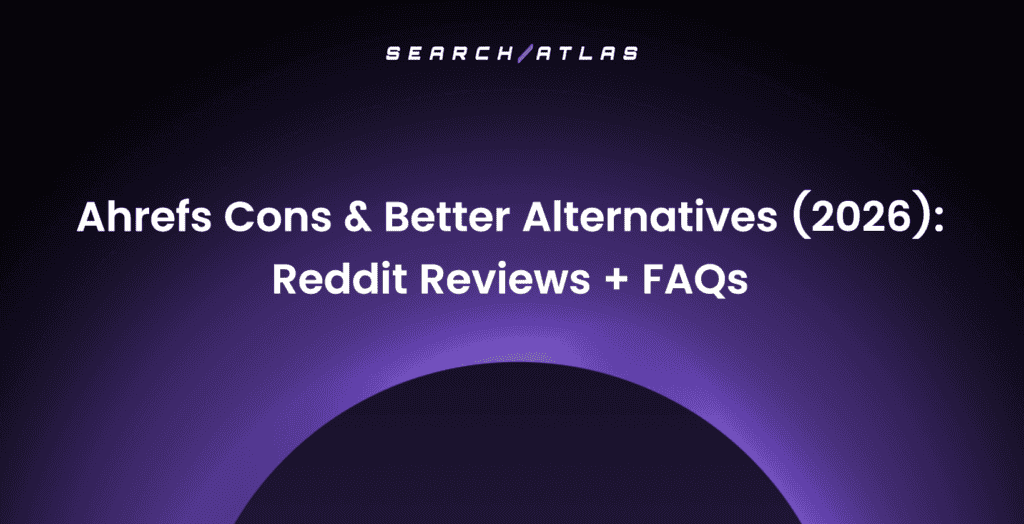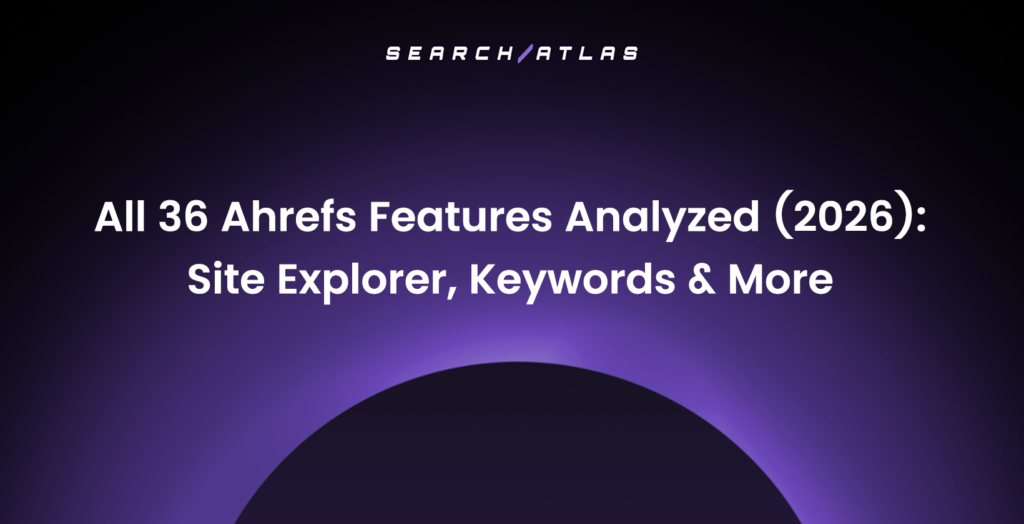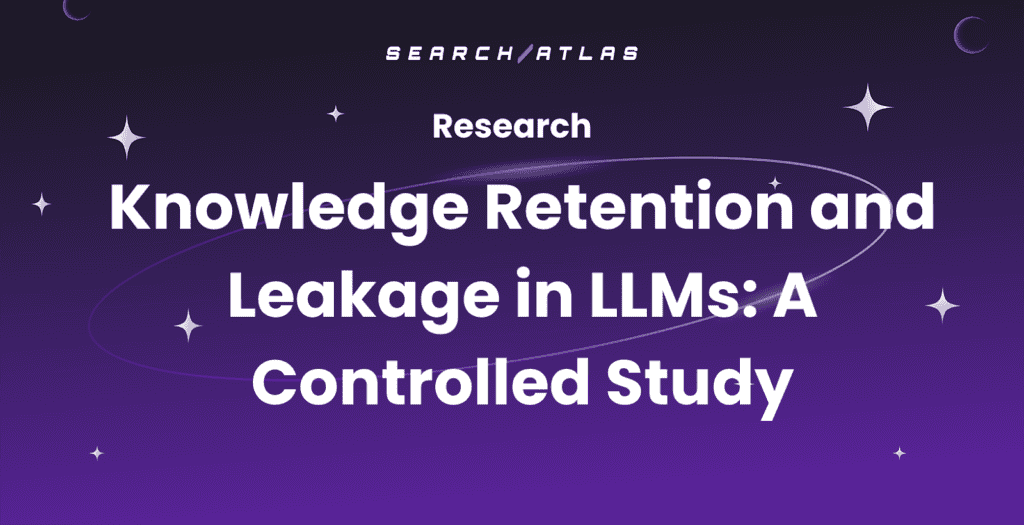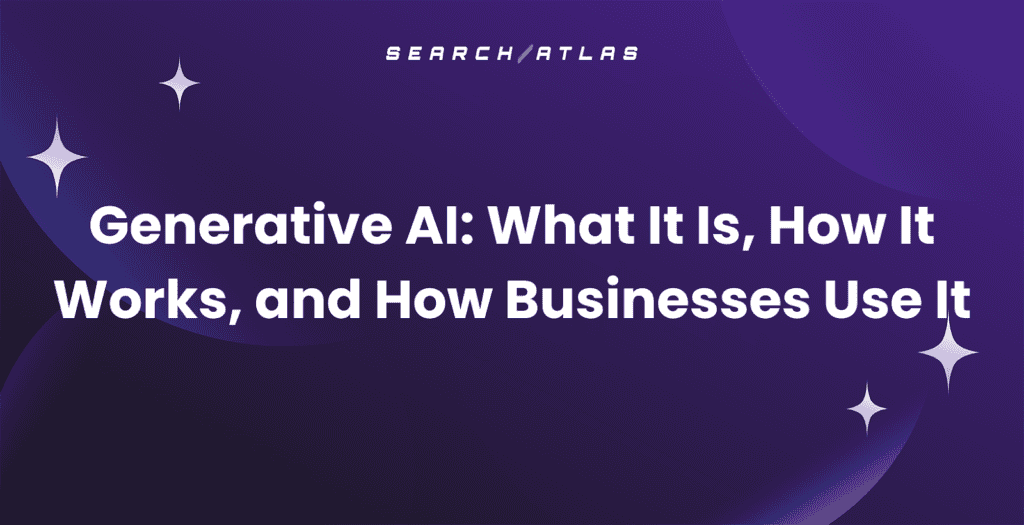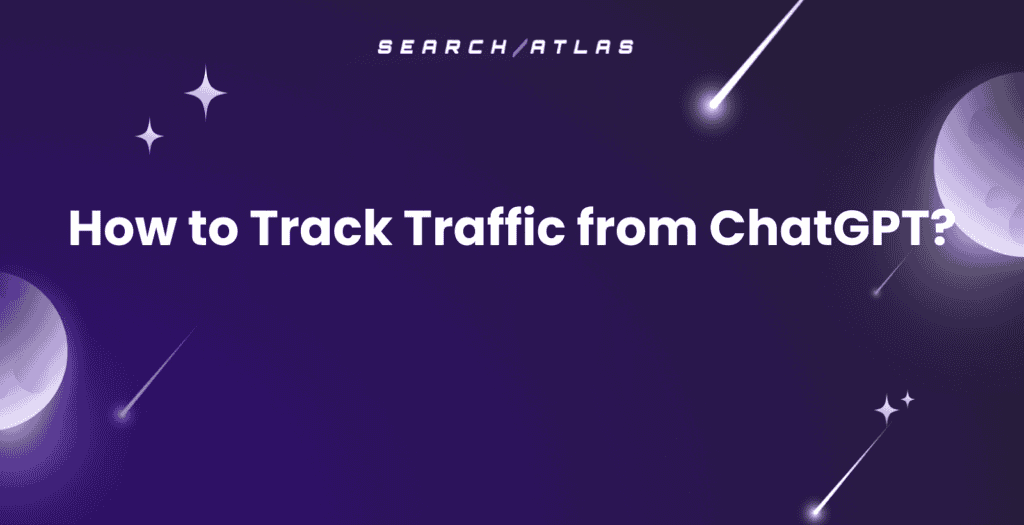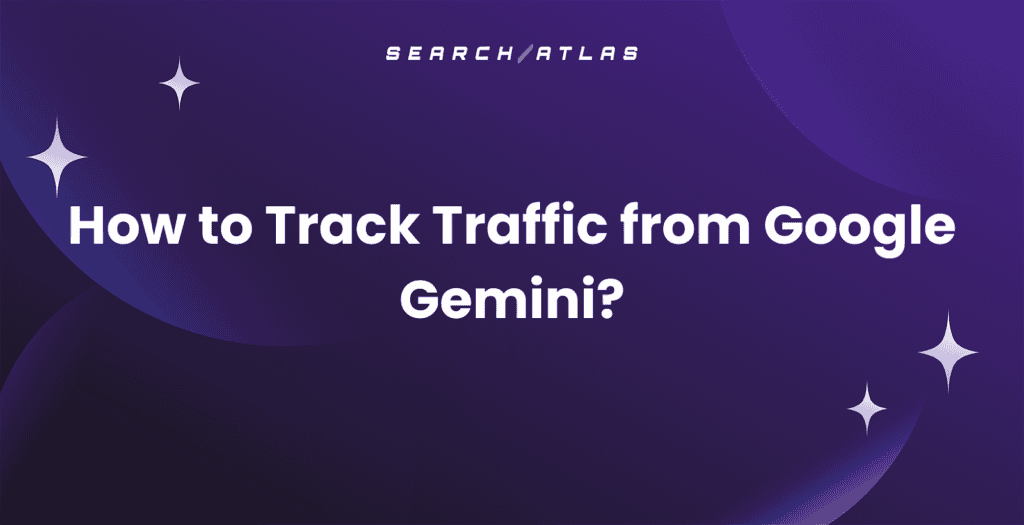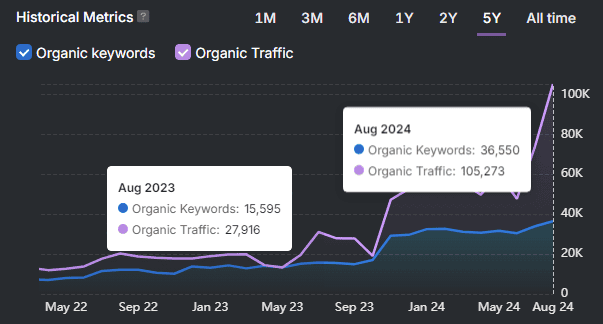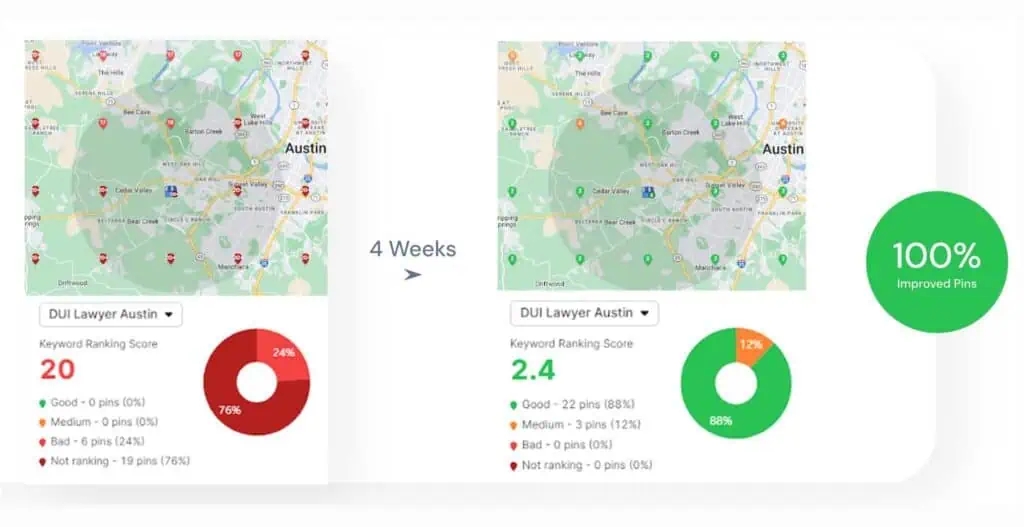The best Semrush alternatives are SEO platforms that replace Semrush in core SEO areas like keyword research, technical audits, competitor tracking, rank monitoring, and reporting, but without the high price tag or fragmented feature model. SEO teams often abandon Semrush after they run into inflated pricing, rigid add-ons, and workflow friction in marketing, SEO, and PPC campaigns. Many of Semrush’s 140+ tools go unused, yet most plans still bundle them behind expensive upsells. Semrush upsells include AI content modules, listing management, and advanced reporting.
Marketers and SEO agencies look for Semrush alternatives that offer cleaner data, native integrations with Google Search Console, and automation that reduces manual effort. The most common reasons for switching to Semrush competitors include daily keyword tracking limits, extra costs for white-label exports, lack of localized SEO tools, and inconsistent SERP visibility in non-U.S. regions.
We highlight the top free, paid, and cheaper Semrush alternatives in 2025, each with stronger value, deeper insight, or smoother execution for essential SEO workflows. The best alternatives to Semrush in 2025 are Search Atlas, SE Ranking, and SpyFu.
The 15 best Semrush alternatives that match every budget are below.
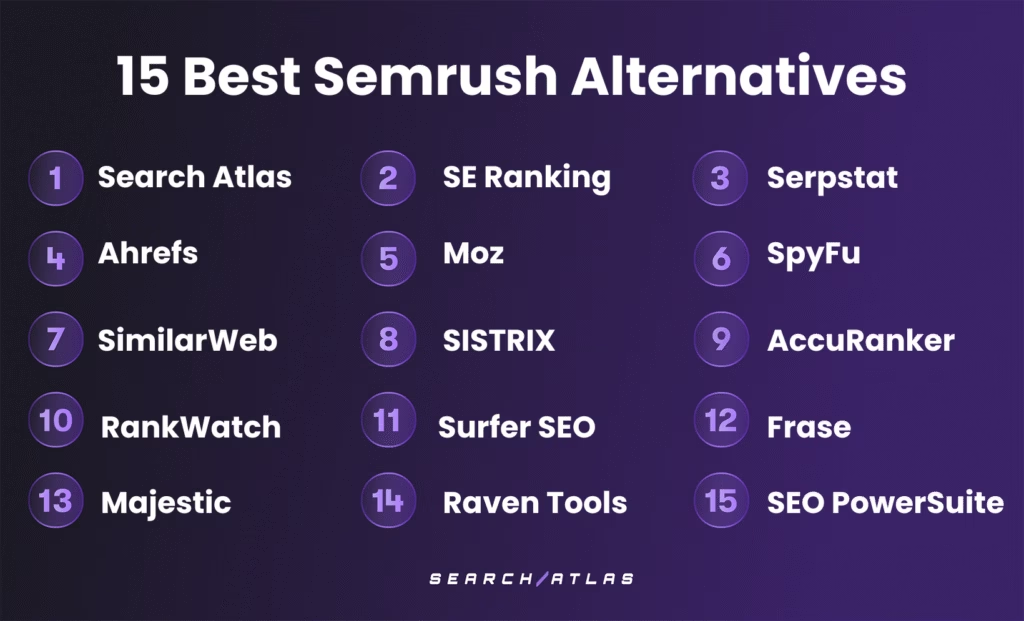
Best All-in-One SEO Alternatives to Semrush
1. Search Atlas
Search Atlas is an all-in-one SEO and PPC automation platform ideal for teams that manage rankings, audits, content, local visibility, link building, and reporting at scale. Search Atlas SEO platform connects directly to Google Search Console, Google Business Profile, and Google Ads to deliver verified live data without relying on modeled estimates or sampling. Semrush reports sampled data from third-party bots, which may miss low-volume or mobile keywords.
Every Search Atlas plan includes OTTO SEO, a built-in AI assistant that automates on-page improvements, internal linking, technical fixes, schema markup, backlink acquisition, and GBP optimization. OTTO SEO fixes are executed directly on your website via JavaScript pixel or WordPress plugin. Semrush only flags issues without resolving them.
For content optimization, the Search Atlas Content Genius tool includes AI-assisted production, real-time SERP comparisons, entity scoring, and internal link recommendations while writing. Semrush provides AI drafts through ContentShake but does not guide topic structure or optimize against top-performing pages. The Search Atlas review confirms stronger semantic alignment and faster content execution.
Search Atlas, as a Semrush competitor, offers stronger local SEO solutions. Search Atlas tracks map pack positions by city, automates GBP updates, and schedules AI-powered review responses. Semrush requires a Local SEO add-on and still lacks heatmap-style visibility or GBP automation.
Search Atlas is one of the best alternatives to Semrush because it supports backlink research, link acquisition, and digital PR in one place. The platform provides access to 100 trillion backlinks and 500 million indexed domains, with filters for anchor text, domain authority, keyword context, and historical trends. Teams use backlink gap analysis and network visualization to map link profiles and identify opportunities.
From there, users launch outreach campaigns with verified contact data, email templates, and automated follow-ups. Semrush shows backlink profiles but lacks outreach tools, contact discovery, or built-in follow-up tracking.
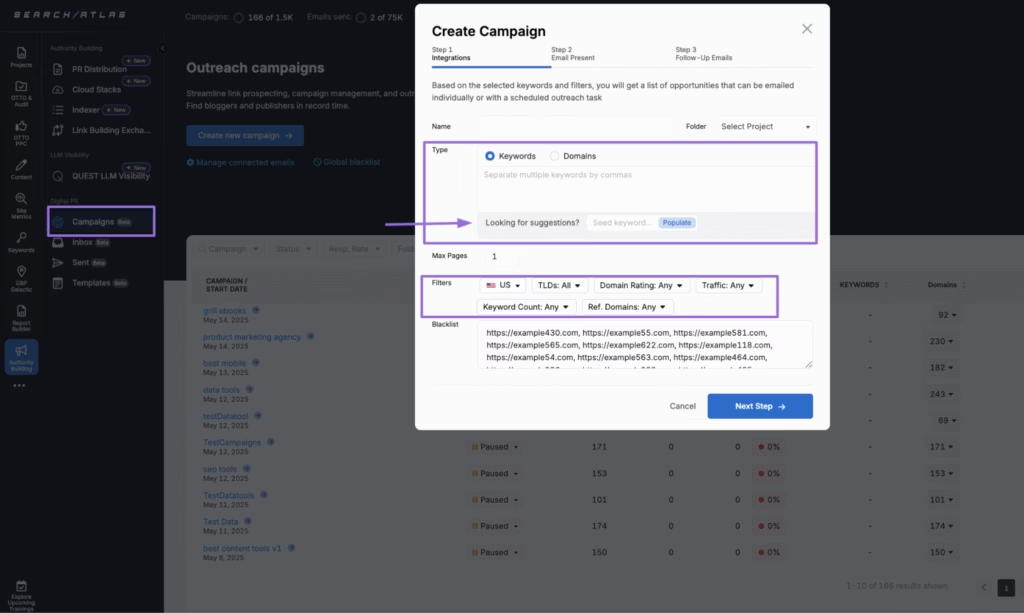
For PPC, OTTO Google Ads handles paid campaigns by optimizing headlines, adjusting bids, and rewriting underperforming ad groups based on Google Ads feedback. This level of PPC automation does not exist inside Semrush. Semrush only provides static PPC insights and requires manual input for campaign adjustments.
Search Atlas is a paid platform, but it is cheaper and offers more value than Semrush across tiers. Search Atlas offers a free trial, and the plans start at $99/month and scale by usage, not by feature unlocks. All tiers include local SEO, AI content tools, and backlink automation with no extra charges.
Pros of Search Atlas include real-time keyword data, AI-powered SEO and PPC automation, built-in local visibility tools, white-label dashboards, multi-user access, and PDF exports without add-ons. The cons of Search Atlas are a steeper learning curve for some advanced features and limited non-Google PPC visibility.
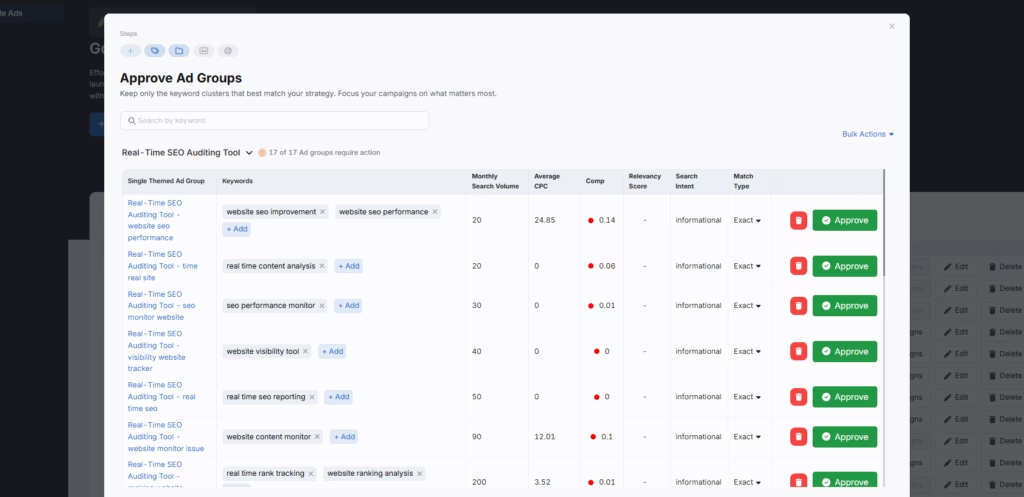
Search Atlas is the best Semrush alternative for agencies and SEOs that manage organic and paid campaigns across multiple locations and domains. OTTO SEO and OTTO Google Ads are a major advantage when we compare Search Atlas vs. Semrush, especially for users who run blended SEO and PPC programs without separate software.
2. SE Ranking
SE Ranking is a cloud-based SEO platform designed for teams and agencies that need automated local SEO tools, precise keyword tracking, and client-ready reporting at a lower price point. SE Ranking combines keyword grouping, rank monitoring, AI-assisted content creation, on-page evaluation, technical audits, and competitor research.
SE Ranking is a better alternative to Semrush for daily SERP visibility, local SEO tracking, and branded reporting. SE Ranking updates keyword positions by country, region, city, and ZIP every 24 hours without charging for refresh frequency. Semrush delays daily updates on lower tiers and charges separately for listing tools, branded exports, and review automation.
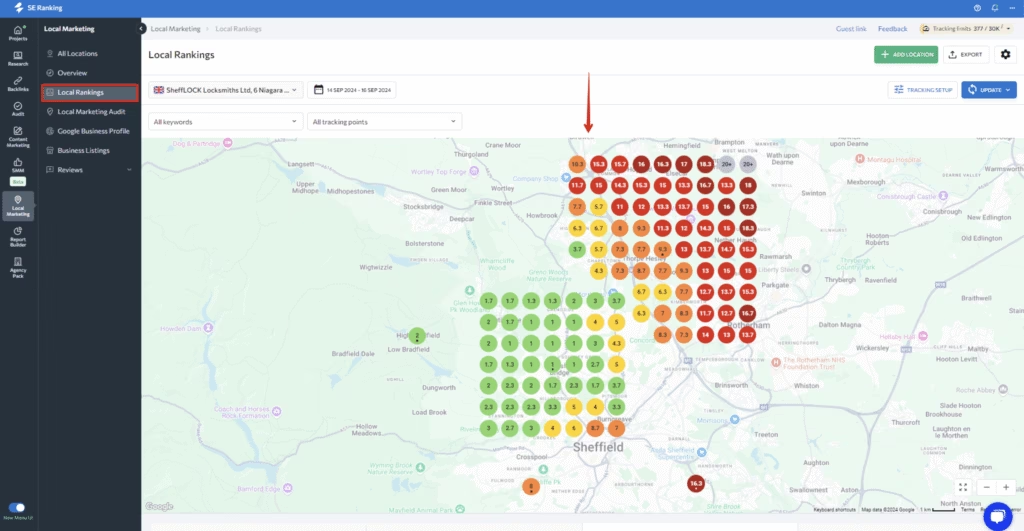
SE Ranking tracks keyword positions with daily updates and location-specific filters, similar to Semrush’s Position Tracker. However, while Semrush pulls from a larger keyword database, SE Ranking’s interface allows faster filtering and simpler group segmentation. This is ideal for use cases that don’t involve trend modeling or PPC crossover data.
The SE Ranking content system includes a SERP-based Content Editor and AI Writer that optimizes structure, keyword density, and tone based on live top-ranking pages. Project tracking, on-page scoring, and keyword clustering all support campaign delivery.
SE Ranking is a paid platform, but it costs less than Semrush at every usage level. Pricing starts at $65/month for 500 daily-tracked keywords and scales to $259/month for unlimited projects and 5,000 tracked keywords. SEOs unlock content editors, listing tools, and AI writers without additional platform fees.
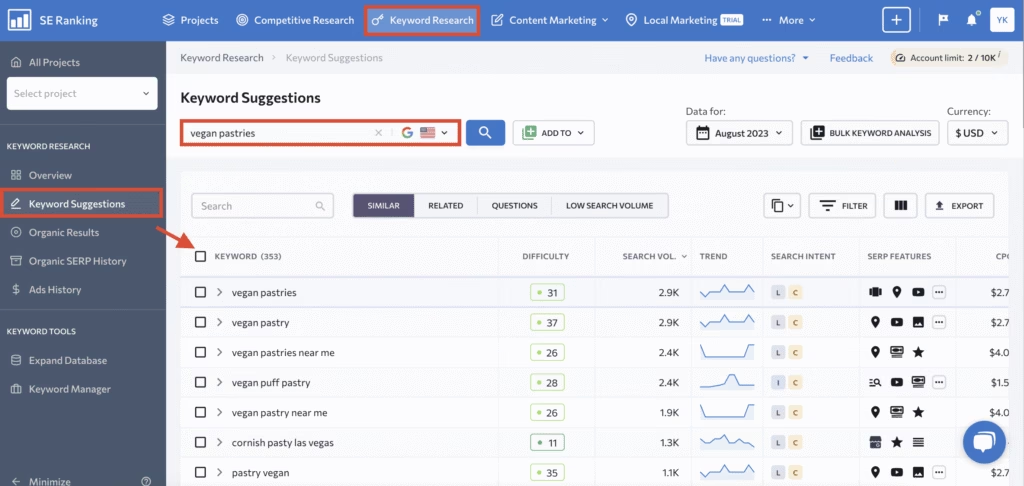
The pros of SE Ranking as a Semrush competitor are fast daily rank tracking, customizable white-label reporting, efficient technical audits, intuitive UX, and better value for money. The SE Ranking Review outlines how it balances rank tracking with strategic features like content planners and backlink gap discovery.
A con of the SE Ranking alternative to Semrush is the smaller backlink database, which limits competitive depth in link analysis.
Teams tracking thousands of keywords benefit from SE Ranking’s fixed project limits and generous quotas, which reduce the need for constant plan upgrades. A detailed SE Ranking vs. Semrush breakdown shows how SE Ranking surpasses Semrush in audit speed, report automation, and ease of onboarding.
3. Serpstat
Serpstat is an all-in-one SEO platform that includes tools for keyword research, rank tracking, backlink audits, site crawls, and AI-supported content workflows. Serpstat supports 230 regions and offers multilingual keyword databases, which makes it one of the most scalable alternatives to Semrush for global SEO teams.
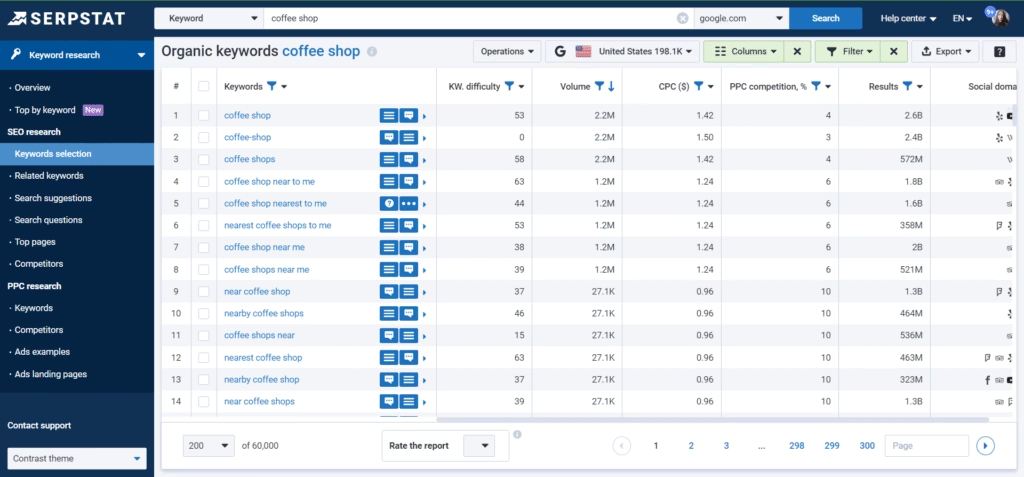
Unlike Semrush, Serpstat includes keyword clustering in all plans and tracks rankings by country, city, or device without gating access. Serpstat groups up to 50,000 keywords by SERP similarity, which accelerates content planning and silo structuring. Semrush offers clustering through third-party tools and restricts geo-level tracking on lower tiers.
Serpstat’s backlink tools compare competitors by link type, referring domains, and shared donors. The audit module assigns issue severity, filters by page type, and tracks changes over time. AI features include originality scoring, rewrite suggestions, and keyword mapping to SERP context.
Serpstat is cheaper than Semrush. Plans start at $59/month with access to core tools, audits, and 10,000 daily checks. Higher tiers unlock API, AI modules, and white-label exports. The Serpstat review highlights flexibility for teams that need SEO tools similar to Semrush without stacked upgrade costs.
Pros of Serpstat are keyword clustering, bulk audit filters, and multilingual targeting. Cons of Serpstat include limited backlink depth and Google Ads-based volume estimates.
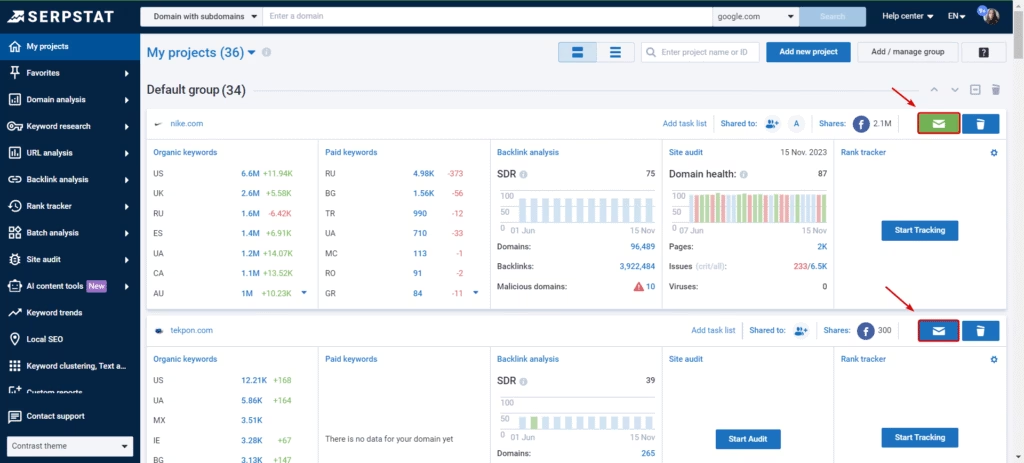
When comparing Serpstat vs. Semrush, Serpstat is a top Semrush alternative for international SEO teams that need broad keyword coverage and regional reporting.
4. Ahrefs
Ahrefs is an SEO software suite that specializes in backlink analysis, rank tracking, and content research. Ahrefs includes a proprietary link index with over 35 trillion links, a keyword database sourced from 170 countries, and content discovery tools built for competitor benchmarking.
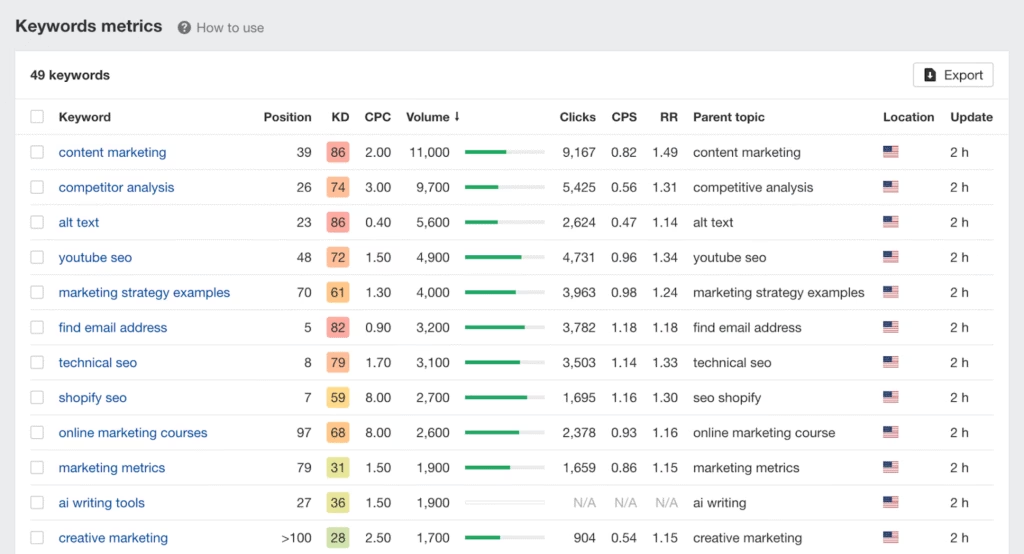
Ahrefs is a stronger Semrush alternative for link intelligence and content-driven SEO. Ahrefs Site Explorer tool reveals full backlink profiles with anchor text, domain strength, and referring page data. Compared to Semrush, Ahrefs updates link data more frequently and exposes deeper historical backlink trends per URL.
Ahrefs includes Keyword Explorer, Rank Tracker, Site Audit, and Batch Analysis tools, which make it a valid Semrush competitor for organic SEO workflows. Clickstream-powered traffic metrics improve keyword accuracy and support content gap discovery.
However, Ahrefs lacks local SEO dashboards, map tracking, or PPC visibility tools, which limits its use for geotargeted or paid search campaigns.
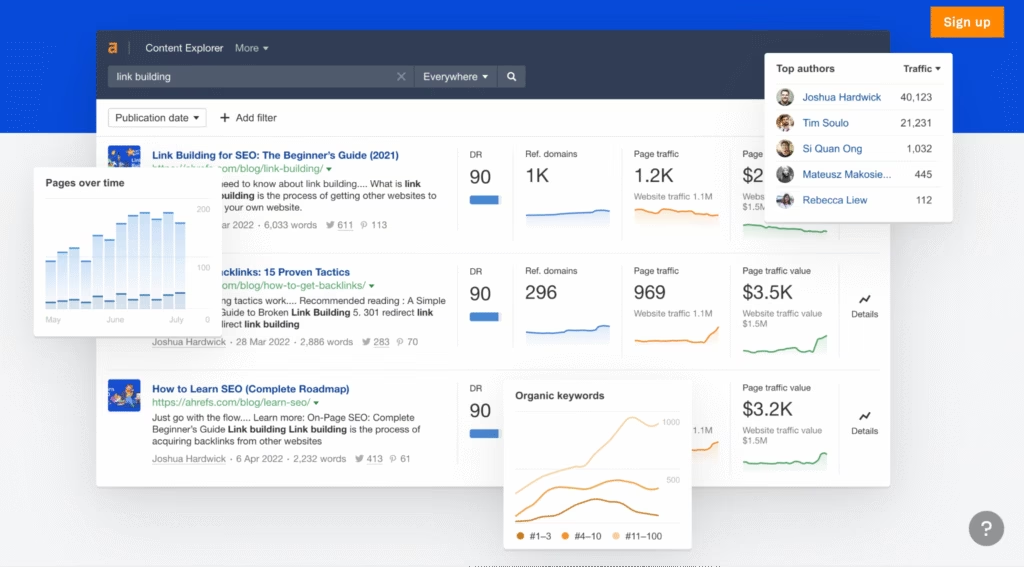
Ahrefs is a paid tool with no free trial except for limited features in Ahrefs Webmaster Tools. Ahrefs entry plan starts at $129/month and includes basic access for five projects, weekly rank updates, and limited credits. Higher tiers range from $249 to $499/month and expand data history, crawl limits, and user seats.
While Ahrefs is one of the more recognized alternatives to Semrush, its rigid credit system, paywalled updates, and missing features for local or agency SEO limit its value for teams with broader needs.
The pros highlighted in the Ahrefs review focus on strong backlink analysis, clean UI for site audits, and trusted visibility metrics for competitive content. Cons of Ahrefs are limited local SEO, no outreach tools, pay-per-credit usage, and lack of real-time rank data.
Ahrefs is a better choice than Semrush for link auditing and competitive content research, but not for campaign-level PPC or social visibility.
5. Moz
Moz is an all-in-one SEO suite that centralizes keyword research, backlink tracking, technical audits, and local visibility tools (Moz Local). Moz Pro organizes metrics into accessible dashboards that support SEO strategies for national and local campaigns.
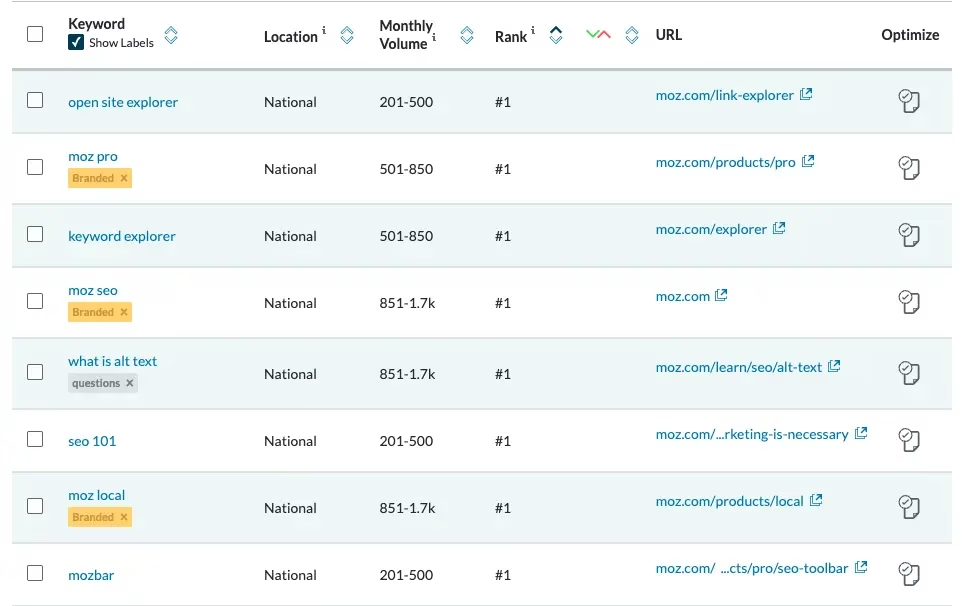
Moz is a great alternative to Semrush for local SEO and small team workflows. Moz includes core modules for keyword discovery, link research, and page diagnostics, but offers fewer automation layers and integrations compared to platforms like Semrush or Ahrefs.
Moz Pro’s keyword tools surface SERP features, volume, and difficulty from a 1.25 B+ keyword index. Link Research and Link Intersect analyze backlink quality and overlap, while the Site Crawl tool prioritizes technical errors by week. Rank Tracker, GeoRank, and Citation Management provide localized performance insights that help optimize for regional queries.
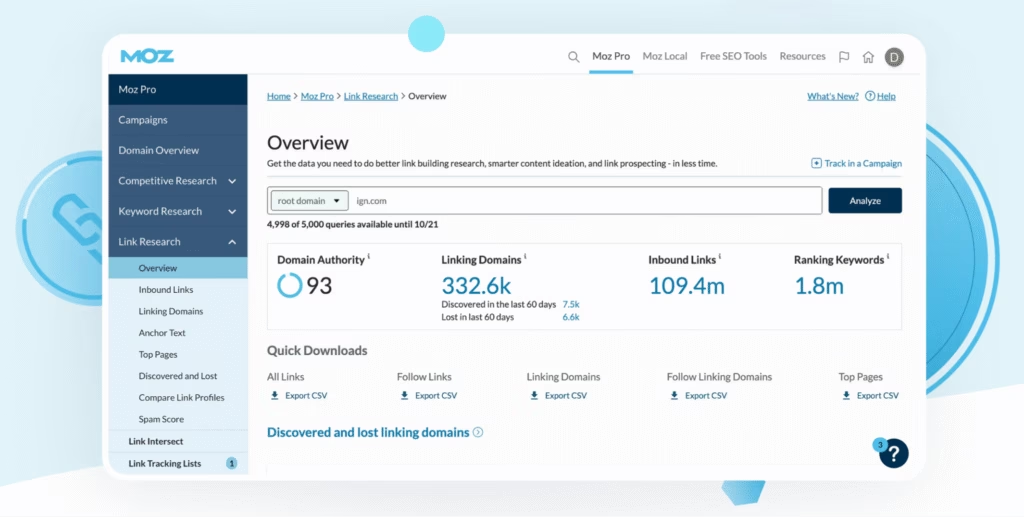
Moz Pro starts at $39/month, making it one of the cheapest Semrush alternatives. Moz’s top plan costs $239/month and supports up to 25 websites and 3,000 tracked keywords. There is no free plan, but users can test with a 30-day trial.
Pros outlined in the Moz Review include consistent local SEO support, keyword intent filters, and structured weekly crawling. Cons of Moz include a smaller keyword index than Semrush or Ahrefs, fewer automation tools, and limited functionality for agencies scaling large client portfolios.
In Moz vs Semrush, Moz is a better fit for solo users or small businesses who prioritize local visibility and basic link insights over multi-channel SEO campaigns.
Best Semrush Alternatives for Keyword and Competitor Intelligence
6. SpyFu
SpyFu is a keyword and PPC intelligence tool that reveals the organic and paid strategies behind competitor domains. SpyFu specializes in historical search data, ad copy archives, and keyword overlap analysis. SpyFu helps teams uncover which keywords a competitor ranks for, which ads they run, and how strategies evolve.
SpyFu is better than Semrush for long-term PPC analysis and SEO competitor insights. The SpyFu platform stores 19+ years of Google Ads data, including ad copy, estimated budget, and keyword positioning history of every domain. Semrush includes paid tools, but it limits archived access and restricts exports on lower-tier plans.
SpyFu’s Kombat feature shows shared, exclusive, and missing keywords between domains. Competitor Kombat’s view accelerates gap analysis for SEO and PPC. SpyFu includes filters for keyword type, bid trend, and search frequency.
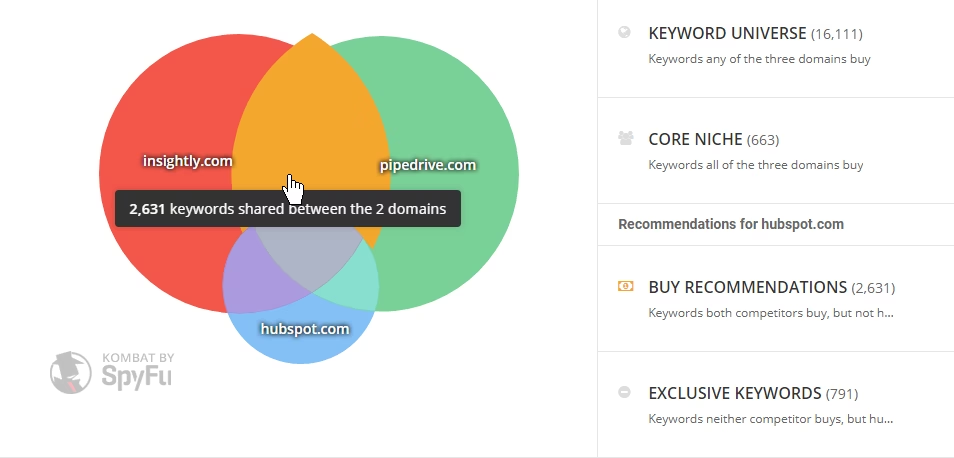
SpyFu is considerably cheaper than Semrush. Plans start at $9/month with unlimited searches, exports, and tracked domains. No other Semrush competitors match this level of access at that price. The SpyFu review confirms strong value for freelance marketers and PPC-focused teams that prioritize data access.
SpyFu pros are full export access, historical keyword tracking, PPC archive depth, and unlimited search volume. Cons of SpyFu include limited technical SEO tools, shallow backlink crawling, and no live content optimization tools.
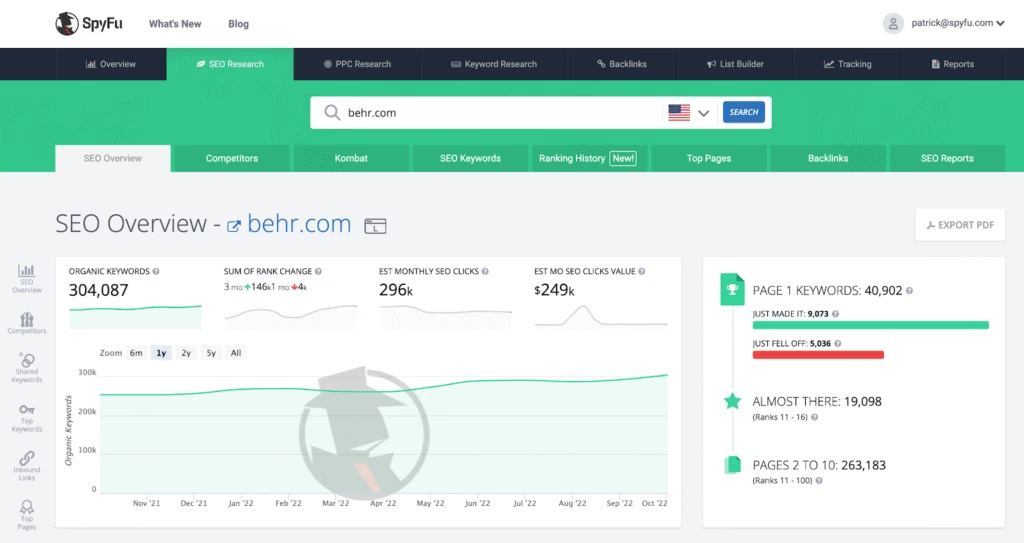
In the SpyFu vs. Semrush comparison, SpyFu is a more useful tool like Semrush for users who care about competitor intelligence, but not technical audits or content scoring.
7. SimilarWeb
Similarweb is a digital intelligence and data aggregation platform that focuses on traffic source analysis, competitor benchmarking, and market research. Similarweb provides aggregated data from browser plugins, ISP partnerships, and user panels to model site visits, referral paths, ad exposure, and channel mix. Unlike traditional SEO platforms, Similarweb emphasizes share-of-voice metrics and top-funnel visibility over crawl-based insights.
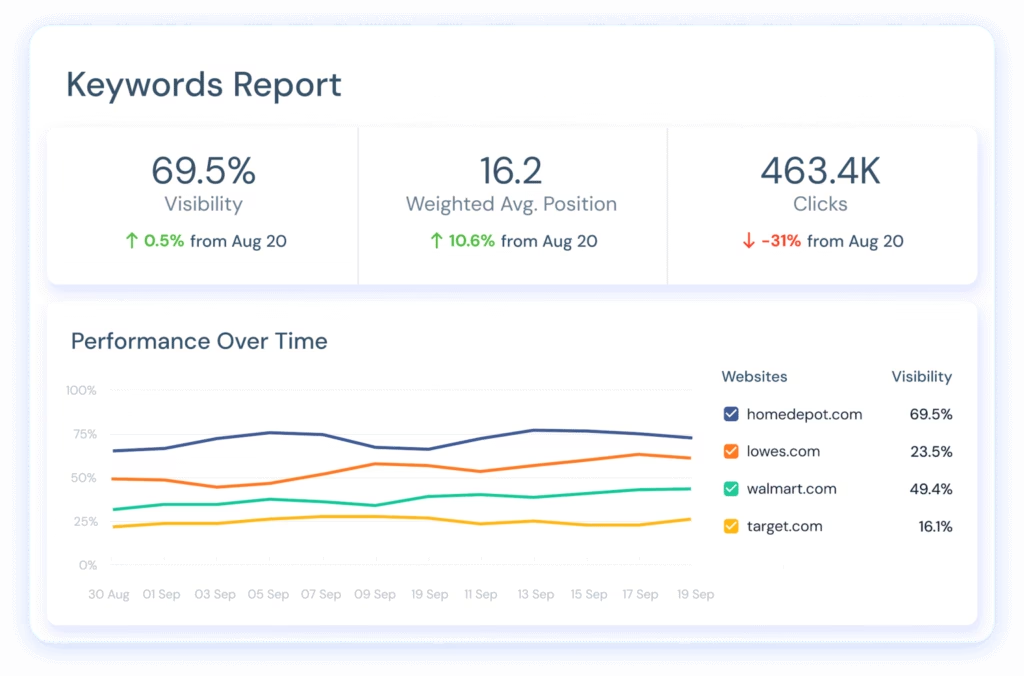
Similarweb is a stronger Semrush alternative for traffic analytics and digital market comparisons. Similarweb breaks down web traffic by channel, geography, device, and referring source. While Semrush offers keyword traffic estimates, Similarweb reveals total traffic volume, session quality, and visit duration across competing domains. This makes Similarweb more useful for benchmarking audience overlap, uncovering acquisition patterns, and comparing brand visibility.
Similarweb supports organic keyword tracking, backlink analysis, and website audits, but not at the same depth or precision as dedicated SEO tools. It does not index backlinks directly and relies on traffic modeling. Users who require daily rank tracking or technical error resolution may find Similarweb limited in those areas.
Similarweb is a paid tool with no free tier. Entry plans begin at $199/month for limited features, while team access starts at $14,000/year and includes historical data, country-level segmentation, and up to 100,000 tracked keywords.
Pros cited in the Similarweb review are high-level traffic visibility, market share snapshots, and exceptional data for media planning and benchmarking. Cons of Similarweb include reduced accuracy for low-traffic sites, limited backlink transparency, and high entry pricing.
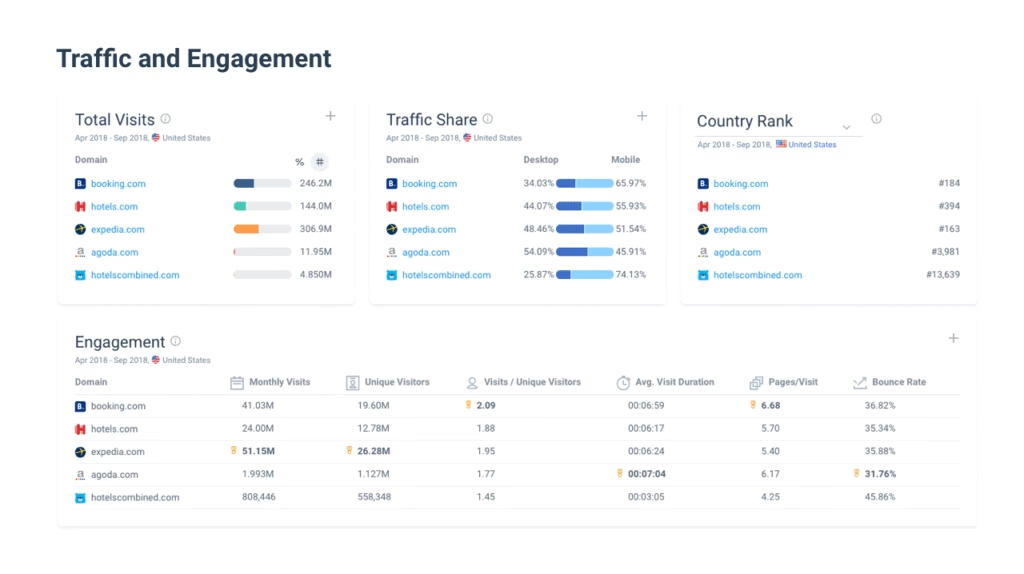
When contrasting Similarweb vs Semrush, Similarweb is the superior choice for competitive traffic research and share-of-market comparisons, but not for granular SEO implementation or backlink-driven campaigns.
8. SISTRIX
SISTRIX is a visibility-based SEO platform that specializes in tracking keyword rankings and SERP performance for international markets. SISTRIX monitors visibility shifts in near real-time and aggregates ranking data into a proprietary Visibility Index.
Unlike traditional all-in-one SEO tools, SISTRIX prioritizes modular analysis and market-specific SERP coverage for over 200 countries and languages.
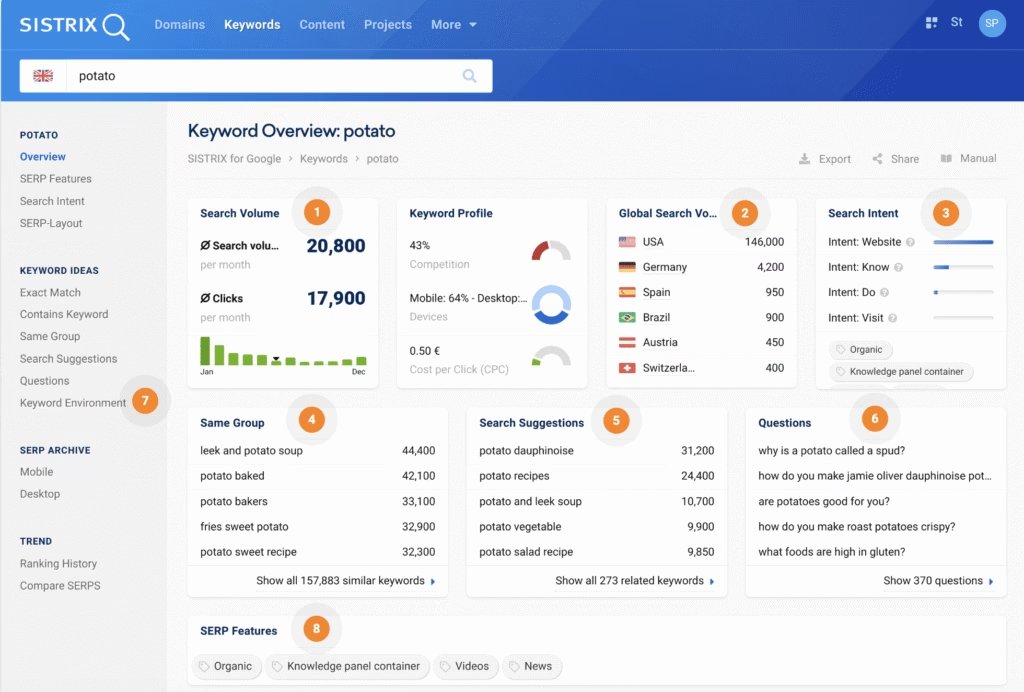
SISTRIX is a stronger Semrush alternative for real-time rank tracking and regional search visibility in Europe. Its Visibility Index measures performance changes by domain and keyword, highlighting emerging trends before other platforms update.
While Semrush includes ranking insights, SISTRIX delivers higher frequency updates and clearer SERP movement signals, particularly for multilingual SEO campaigns.
SISTRIX offers keyword research, technical audits, backlink data from multiple providers, and AI-supported content tools. However, its backlink database depends on integrations with third-party sources like Majestic, and its on-page optimization tools offer fewer actionable suggestions compared to competitors. The SISTRIX review shows that its interface favors experienced SEOs and concentrates more on accuracy than automation.
SISTRIX is a paid platform with no free plan. Pricing starts at €119/month (plus tax) for core modules. Larger teams require the Plus or Professional tiers, which unlock historical data, expanded user seats, and API access.
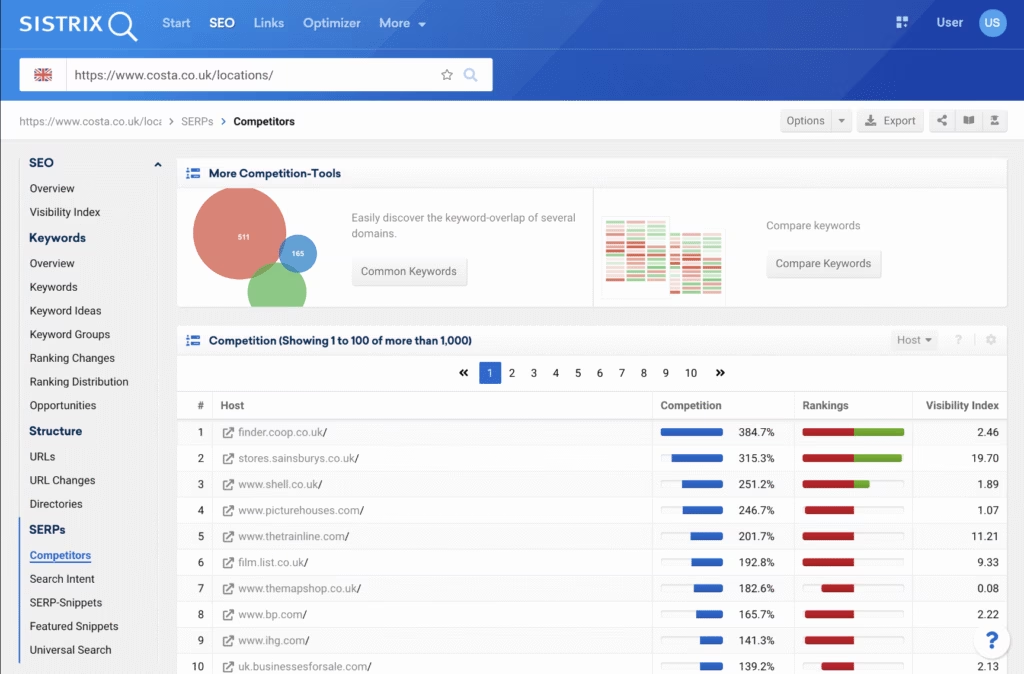
Pros of SISTRIX include advanced rank tracking in Europe, modular pricing, and reliable visibility benchmarks. Cons of SISTRIX are limited backlink depth, minimal PPC features, and fewer tools for technical issue resolution.
When we stack up SISTRIX vs Semrush, SISTRIX performs better for SERP visibility monitoring and market-specific SEO campaigns, but it lacks the breadth and integration depth of full-suite Semrush competitors.
Best Semrush Alternatives for Rank Tracking
9. AccuRanker
AccuRanker is a high-speed rank-tracking platform that delivers on-demand updates, advanced segmentation, and reliable SERP feature data. AccuRanker focuses on keyword position monitoring at scale and supports enterprise SEO workflows with dynamic filtering, historical snapshots, and proprietary CTR models. It tracks search results by country, device, and location down to the ZIP code level.
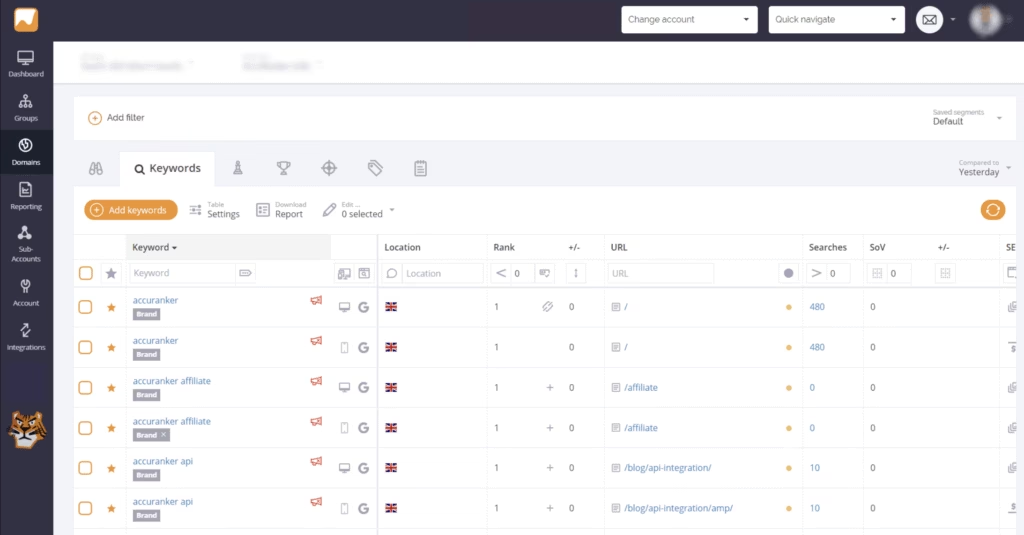
AccuRanker is a Semrush concurrent for real-time rank tracking, SERP feature visibility, and localized keyword monitoring. The AccuRanker platform refreshes keyword rankings daily by default and allows full on-demand updates. While Semrush includes rank tracking, AccuRanker delivers more control over frequency, tagging logic, and regional filtering, especially for large-scale datasets.
The core features AccuRanker offers include a Share of Voice model, AI-estimated CTR by position, segment-based competitor analysis, and a 24 B+ keyword research database. The platform supports dynamic tagging, pixel-level SERP analysis, and integrations with Looker Studio, Google Search Console, and Adobe Analytics. However, it excludes backlink audits, technical site crawls, and content optimization tools found in broader SEO tools like Semrush.
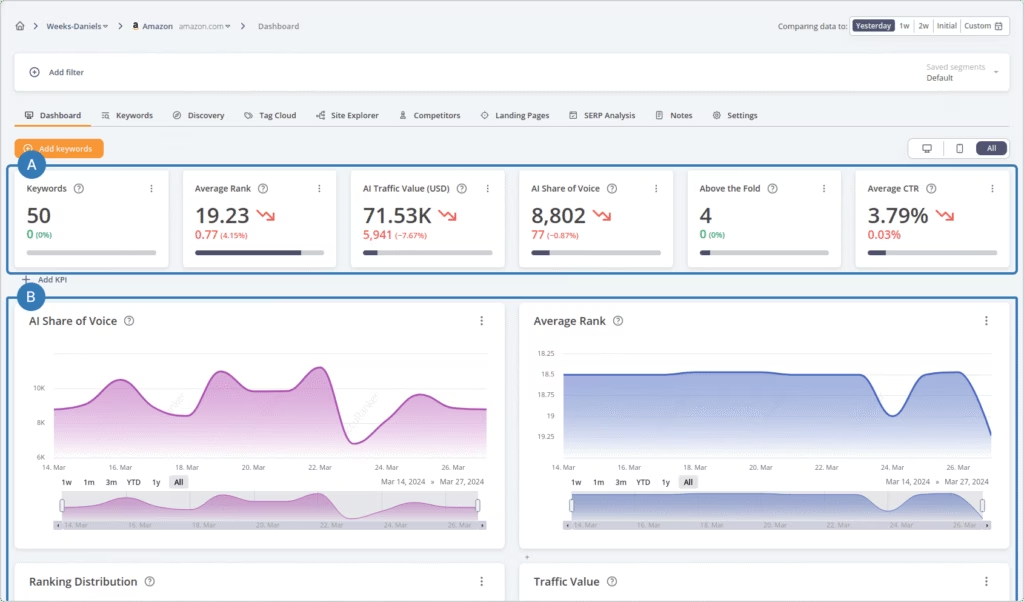
AccuRanker is a paid tool with no free version. Plans start at $129/month for 1,000 keywords, with pricing scaling based on keyword volume. All plans include API access, full features, and unlimited domain tracking within usage caps.
Our AccuRanker review testifies to AccuRanker’s pros like fast updates, precise local tracking, and high transparency in SERP-level metrics. AccuRanker’s cons include the lack of backlink, audit, or content tools, and limited value for teams that need more than keyword data.
10. RankWatch
RankWatch is a cloud-based SEO platform for rank tracking, keyword research, competitor analysis, and site auditing. It supports agencies and large-scale SEO projects with unlimited domain tracking and flexible keyword monitoring plans. The platform includes a proprietary AI called WebSignals for brand tracking and a white-label reporting engine.
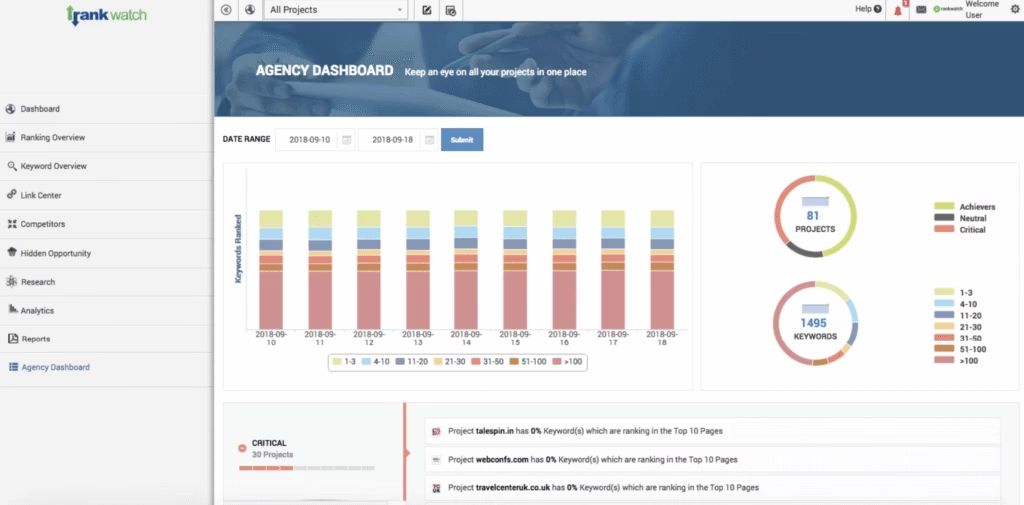
RankWatch is a practical Semrush alternative for rank tracking, technical audits, and scalable reporting. Unlike Semrush, RankWatch allows unlimited domains on all plans and offers cost-effective options for projects that demand bulk keyword tracking. Its Rank Tracker updates positions daily across devices, locations, and search engines without usage caps.
While Semrush limits keyword refresh frequency and adds costs for extra domains, our RankWatch review shows that the platform keeps the billing predictable.
Core features include Keyword Finder, Website Analyzer, Link Center, and SEO IQ, which gives page-level optimization scores based on real-time SERP data. RankWatch review shows automation for white-label client reports and backlink tracking with anchor context and link history.
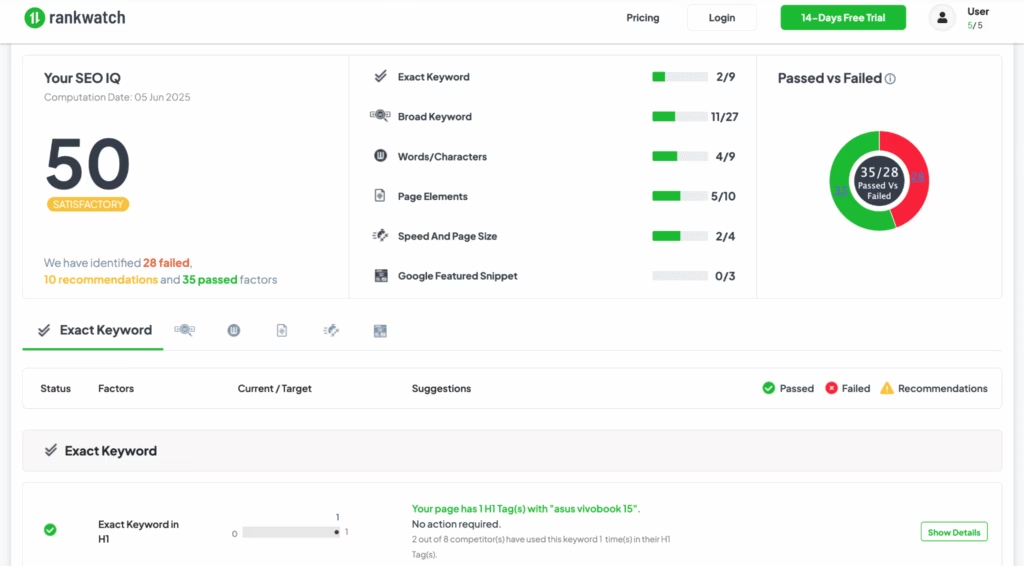
RankWatch is a paid SEO tool with custom plans starting at $29/month for freelancers. Plans scale based on keyword volume, not by feature unlocks. Custom plans ranging from $25/month are available for agencies that handle hundreds of domains or large keyword datasets.
The pros of RankWatch are unlimited domain tracking, budget-friendly scaling, and customizable reporting. RankWatch’s cons include limited PPC and backlink depth, fewer AI tools, and no advanced content scoring.
When comparing RankWatch vs. Semrush, RankWatch offers better flexibility for high-volume keyword monitoring and client management but lacks the breadth of data sources and automation depth that power complex campaigns in other Semrush alternatives like Search Atlas.
Best Semrush Alternatives for Content Optimization
11. Surfer SEO
Surfer SEO is a content optimization platform that scores and improves pages based on live SERP data. Surfer SEO analyzes top-ranking pages for a given keyword, extracts NLP entities, and recommends structural edits, keyword usage, and length benchmarks. Writers use Surfer to align content with real-time search intent and ranking factors, page by page.
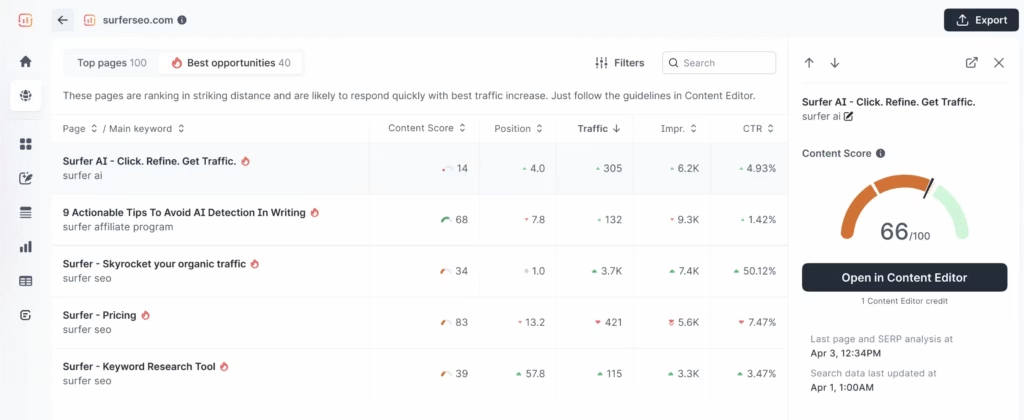
Surfer SEO is a limited Semrush alternative focused on on-page content only. Surfer SEO outperforms Semrush’s SEO Writing Assistant in contextual precision and NLP coverage. Surfer scores content against live SERPs and provides real-time suggestions for entities, sentence structure, and heading hierarchy.
Semrush uses a static scoring model that often mismatches intent or overweighs secondary keywords.
Surfer SEO includes the Topical Map, Content Editor, Audit, and Surfer AI modules. Writers use the Topical Map to generate internal linking structures. The Audit Tool tracks on-page errors and missing terms over time. Surfer AI produces full drafts with NLP-optimized outlines and competitive formatting. Surfer offers free tools like AI Detector, AI Humanizer, and the Keyword Surfer extension. The Keyword Surfer shows search volume and keyword data inside Google SERPs.
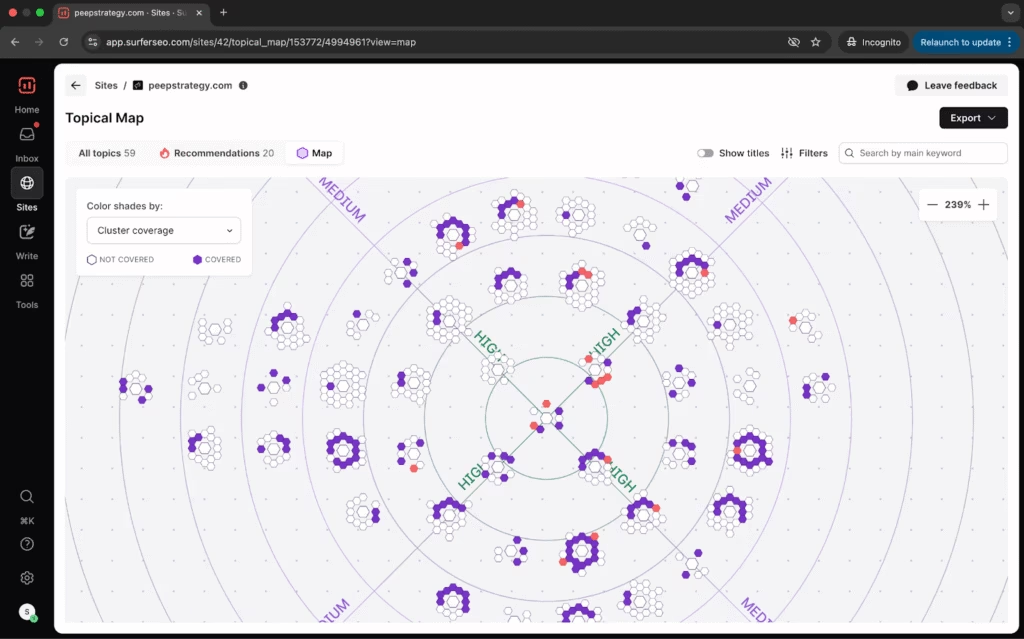
Surfer SEO is a paid tool with plans starting at $99/month. Pricing scales are based on content editor credits. Surfer does not include technical audits, backlink analysis, or rank tracking like Semrush, and functions best when paired with third-party data.
The pros featured in the Surfer SEO review include real-time SERP alignment, strong NLP guidance, and actionable content scoring.
Surfer SEO cons are limited tool scope outside of content, no backlink or rank tracking features, and dependence on external keyword sources.
In the Surfer SEO vs. Semrush comparison, Surfer SEO is a better fit for content (re)writing teams, not full-stack SEO workflows.
12. Frase
Frase is a content optimization and AI writing platform that specializes in SERP-informed brief creation. Frase extracts headings, questions, and structure from top-ranking pages to help writers generate SEO-aligned content.
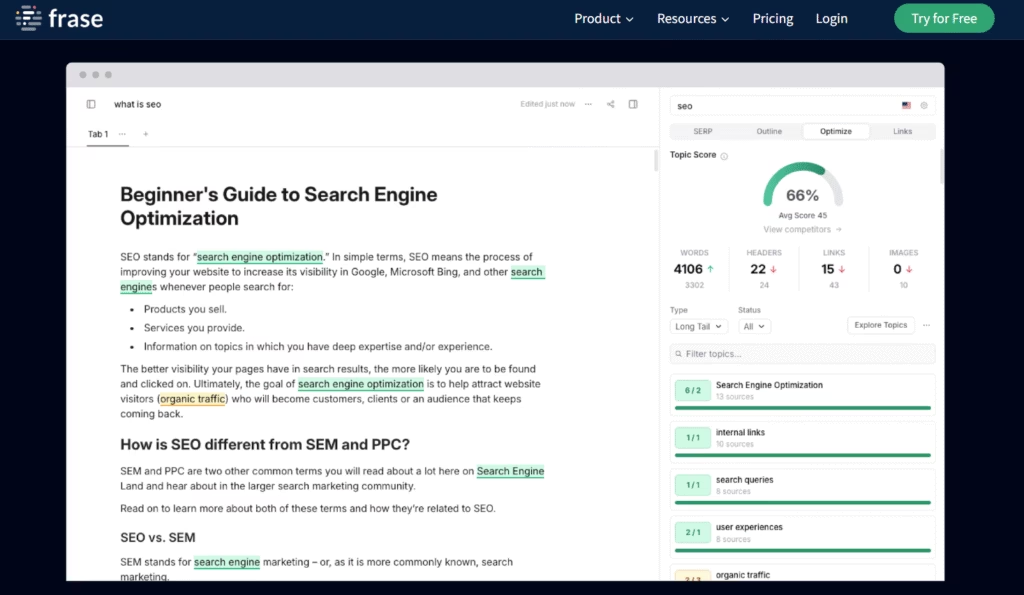
Frase, as an alternative to Semrush, supports workflows for freelancers, in-house marketers, and content agencies to build outlines, surface related questions, and speed up production with AI-generated drafts.
Frase stands apart from Semrush by focusing solely on content ideation and optimization, not full-suite SEO, as confirmed by our findings in the Frase review.
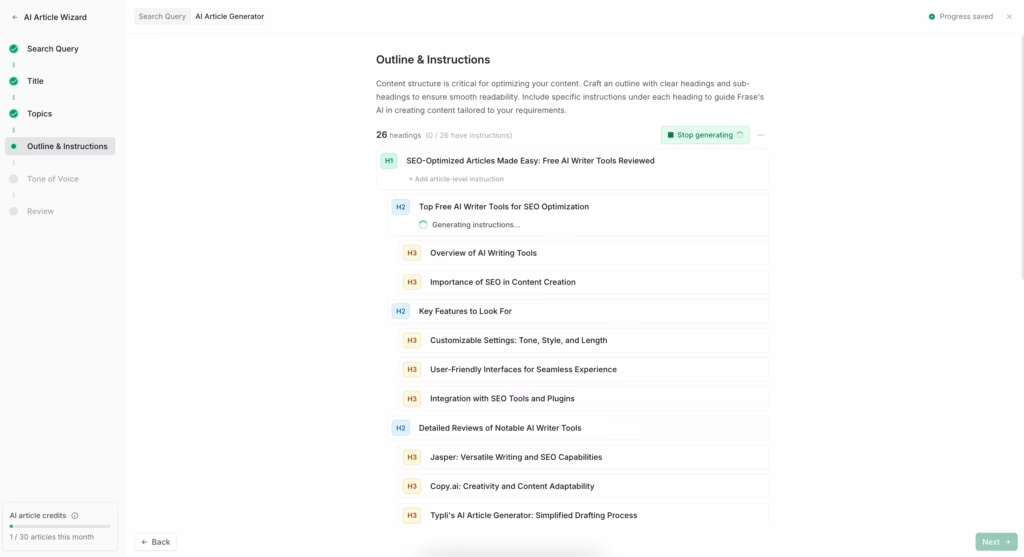
Frase replaces features like Semrush’s SEO Writing Assistant and ContentShake but lacks tools for backlink audits, keyword tracking, or technical analysis. Users who rely on keyword data, rankings, or backlink visibility will need to supplement Frase with other platforms.
Frase plans start at $15/month for solo creators and go up based on content and query volume. Frase is more affordable than Semrush for content-only users but offers less semantic precision than Surfer SEO and fewer on-page scoring features than Search Atlas.
Frase pros include quick SERP-informed brief generation, AI draft creation, and an intuitive UI for outlining. Cons of Frase are a lack of backlinks, ranking, or audit features, and limited NLP scoring depth.
Frase is a clear Semrush alternative only for content brief creation and AI-assisted drafting, not for technical SEO, link building, or full campaign management.
Best Semrush Alternative for Backlinks Analysis
13. Majestic
Majestic is a dedicated backlink analysis platform that maps the link graph across the web. Majestic offers two proprietary metrics, Trust Flow and Citation Flow. Trust Flow measures link quality, and Citation Flow measures link quantity. Majestic indexes billions of URLs and provides tools for backlink discovery, domain comparison, and link profile visualization.
Majestic is the strongest Semrush alternative for pure link intelligence. Majestic focuses exclusively on backlink data, unlike Semrush, which includes backlinks as part of a broader SEO suite.
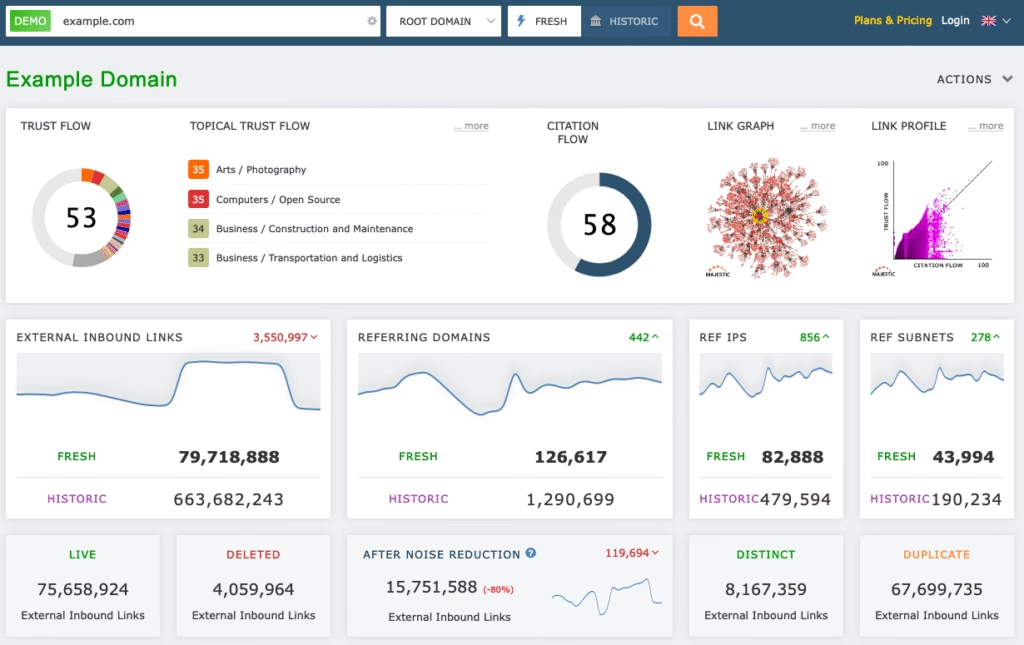
Majestic offers deeper historical context, cleaner reports, and more link-level segmentation for referring domains, anchor text, and crawl status compared to tools similar to Semrush.
Majestic starts at $49.99/month with plans that scale by index size and report limits. All tiers focus on backlinks only.
Pros shown in the Majestic review feature deep link context, proprietary authority scoring, and strong historical data.
Majestic cons include no support for content, keywords, or rank tracking, and a dated interface that requires acclimation.
When it comes to Semrush vs Ahrefs vs Majestic, Majestic is a clear alternative to Semrush and Ahrefs for agencies and SEO analysts that focus on backlink audits, toxic link cleanup, or link-building prospecting.
Best Semrush Alternatives for Reporting and Auditing
14. Raven Tools
Raven Tools is a cloud-based SEO and PPC reporting platform with features for keyword tracking, technical audits, backlink management, and white-label reporting. Raven Tools pulls data from sources like Google Analytics, Search Console, Moz, and Majestic to generate reports and track site health.
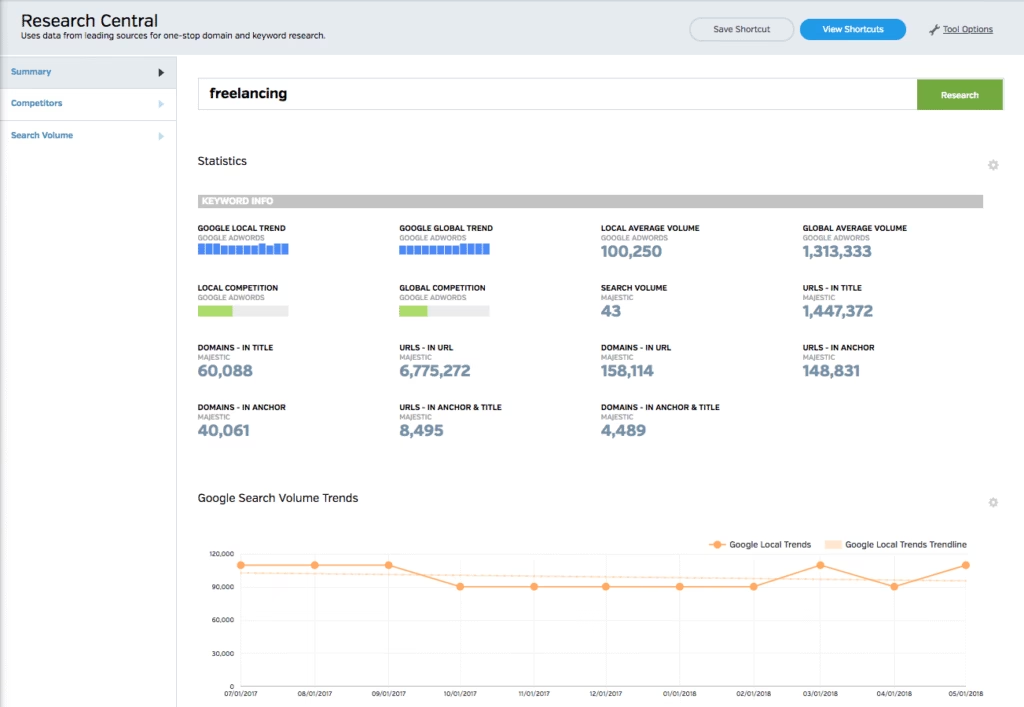
Raven Tools includes modules for keyword suggestions, rank tracking by location and device, backlink evaluation, site crawling, and competitor comparisons.
Compared to Semrush, Raven Tools works better for reporting-focused workflows and site audits across many domains. Raven Tools offers simpler access to white-label exports and supports automated multi-channel reporting, while Semrush requires add-ons for branded PDFs and advanced reporting features.
Raven Tools handles rank tracking, site auditing, and basic backlink monitoring well, but it lacks the keyword database size, content optimization tools, and PPC insights available in tools like Semrush.
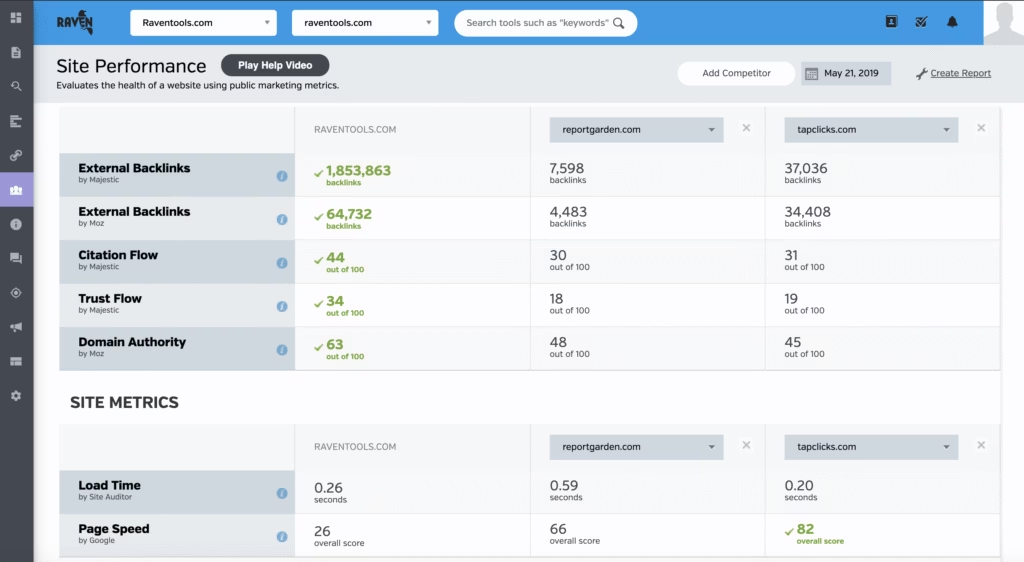
Raven Tools is a paid platform. Pricing starts at $49/month for two domains and scales up to $479/month for 320 campaigns and 40 users. Every plan includes rank tracking, audits, reporting, and link management. Semrush charges more across all tiers.
According to our Raven Tools review, the pros of Raven Tools include lower pricing, stronger multi-client reporting, and higher crawl caps for audits.
Raven Tools’ limitations are smaller keyword datasets, fewer content SEO tools, and limited automation other than reporting.
When we look at Semrush vs. Raven Tools, Semrush suits larger teams that require detailed keyword modeling, paid search integration, and advanced content workflows. Raven Tools fits smaller agencies that prioritize cost control and client-facing performance summaries.
15. SEO PowerSuite
SEO PowerSuite provides a desktop-based SEO software suite that includes tools for keyword tracking, backlink audits, technical analysis, and outreach management.
The SEO PowerSuite platform consists of four applications. The four SEO PowerSuite applications are Rank Tracker, Website Auditor, SEO SpyGlass, and LinkAssistant.
SEO PowerSuite tools operate locally on a user’s computer, which supports detailed control over crawl settings, link evaluation, and outreach workflows.
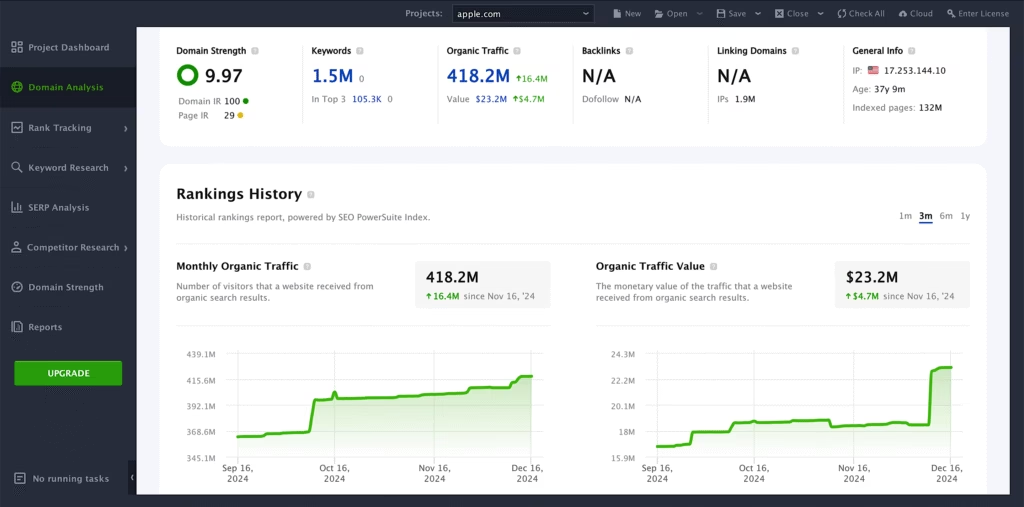
Compared to Semrush, SEO PowerSuite offers stronger customization for technical audits and link-building operations. Users adjust crawl depth, schedule reports, and segment data offline without cloud usage limits.
SEO SpyGlass performs backlink analysis with access to a proprietary index and integration with Google Search Console. LinkAssistant manages email outreach for backlink acquisition, which Semrush does not support natively.
SEO PowerSuite handles keyword research, rank tracking, and auditing well, but its keyword database lacks the breadth and PPC segmentation of Semrush.
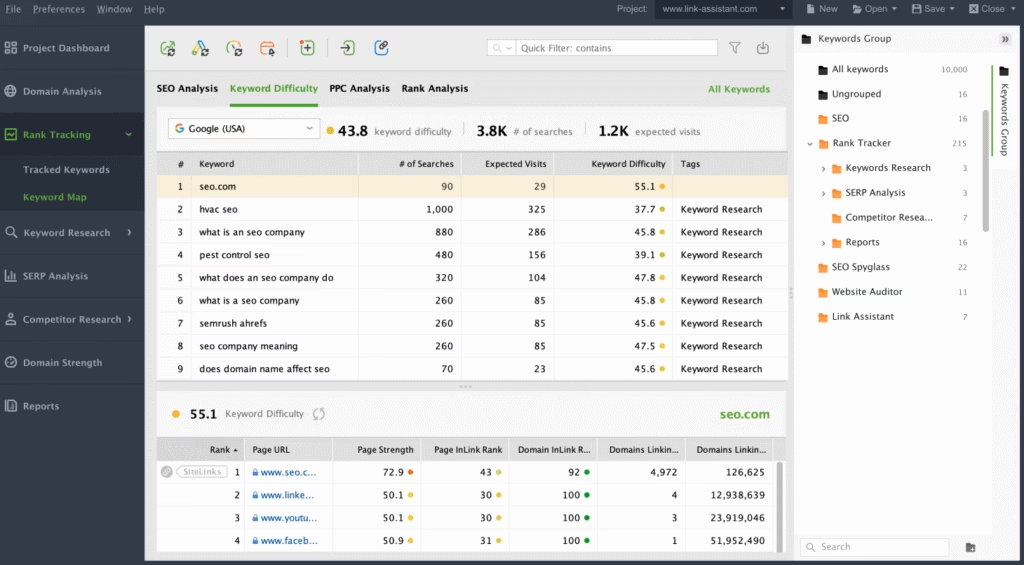
SEO PowerSuite offers a free version with feature limits and paid licenses starting at $299/year. The paid plan includes unlimited project access, white-label reports, and API integration. Unlike Semrush, SEO PowerSuite does not charge monthly fees or enforce credit-based usage caps.
SEO PowerSuite pros are strong technical diagnostics, full audit control, and efficient outreach tracking. The cons of SEO PowerSuite include limited real-time data, no AI content tools, and slower updates compared to cloud-based platforms.
Semrush provides broader online access and unified campaign insights than the SEO PowerSuite. However, the SEO PowerSuite review reveals that it works better for SEOs who prefer desktop environments and require flexible audit and outreach features at a flat annual cost.
Why Do People Seek Alternatives to Semrush?
People seek alternatives to Semrush because the platform overcharges them, limits access to tools that matter, and slows them down. Semrush keeps raising its prices. Many Semrush users switch after hitting keyword caps, struggling with exports, or realizing that core features cost extra.
Most Semrush plans include over 140 tools. Only a few improve performance. Semrush charges for everything in bulk, even if the user only tracks rankings or audits pages. Upgrades become mandatory once a team adds more projects, reports, or tracked keywords. Cost scales without clear value. Support for multi-user workflows and core features like historical data or branded reports stay locked behind advanced tiers.
Add-ons create confusion and inflate monthly costs. Users pay extra for ContentShake, Listing Management, and white-label reports. Many teams expect full access from the start. Instead, they face surprise charges mid-campaign. Agencies report billing gaps across clients and delays from restricted seats or paused exports.
Data issues create further problems. Semrush sometimes misses high-authority backlinks. It often estimates traffic or ranking changes without confirming data from real sources. Competitive domains fail to appear in reports. Reviews from G2 and Reddit mention blind spots in link discovery and keyword updates outside the US.
Tool overload causes friction. Teams move more slowly when audits, writers, and link builders must jump between modules to finish one task. Interface changes take time to learn. Workflow splits lead to longer handoffs and lost momentum. Most alternatives to Semrush resolve this by focusing on specific use cases with faster output.
Teams stop using Semrush when the product stops making sense. The platform no longer supports lean SEO execution. Semrush alternatives simplify work, deliver cleaner data, and charge only for features that support results.
What to Look for in a Semrush Alternative?
The best Semrush alternatives fix what Semrush complicates, restricts, or inflates. These features address Semrush’s limitations in data access, functional depth, and pricing.
The 10 features to look for in a Semrush alternative are below.
- Verified Keyword Research Data. Semrush uses modeled traffic and search volume data, which creates mismatches with actual GSC and GA4 performance. Choose a platform that connects directly to Google data sources or uses real clickstream verification for keyword research accuracy.
- Full Backlink Visibility Without Paywalls. Semrush often limits backlink rows, omits lost link insights, and lacks full anchor context without upgrades. A real alternative exposes new, lost, and toxic links with trust signals, link strength, and domain-level risk metrics, without row limits.
- Unlimited SEO Audits With Deeper Diagnostics. Semrush’s SEO audits cap crawl limits and offer shallow diagnostics for CWV and rendering issues. Choose a tool that scans all pages, flags JavaScript SEO issues, and supports full Core Web Vitals reporting for desktop and mobile at no extra charge.
- Real-Time Content Optimization Without Add-ons. Semrush sells SEO Writing Assistant as a separate module. Look for platforms that include real-time content SEO optimization in their base package with built-in NLP term suggestions, entity scoring, and SERP-aligned structure guidance.
- Accurate Rank Tracking for SEO Reporting. Semrush updates rankings once per day and lacks true device-geo simulation. A strong Semrush alternative tracks rankings by exact device, location, and search engine, and offers daily granularity, zero-click detection, and exportable views for SEO reporting.
- Advanced Competitor Intelligence Without Feature Locking. Semrush competitor tools often split insights across different tabs and upgrade tiers. Choose a platform that includes long-term competitor analysis, shared keyword mapping, domain gaps, and PPC crossover in a single interface.
- Full Local SEO Stack With Map Pack and GBP Integration. Semrush provides limited visibility into local pack rankings and no GBP integration. Look for local SEO tools with city-level keyword tracking, map heatmaps, GBP review monitoring, and location-specific reporting workflows.
- Paid Search and Ad Copy Insights at Scale. Semrush restricts historical PPC data and ad copy scraping. If Pay-Per-Click marketing is a priority, choose platforms that provide complete paid search histories, multi-channel spend visibility, and full competitor ad creative archives.
- Unlimited Reports and User Access With Custom Dashboards. Semrush charges more for additional seats, white-labeling, and custom reporting. The right alternative supports unlimited branded reports, full team access, and permission controls from the base tier.
- Flat Pricing With No Feature Gating. Semrush segments core tools in three pricing tiers, and locks power users into the “Guru” or “Business” plans. A better alternative to Semrush offers full access at every tier, scales by data usage or team size, and never restricts workflow-critical features.
Semrush alternatives must solve pain points like data inaccuracy, feature stacking, and modular upselling. Strong platforms consolidate core SEO workflows without forcing upgrades. They offer verified data sources, real-time optimization, and transparent pricing from day one.
Which Semrush Alternative Offers the Best Balance of Features and Price?
Search Atlas offers the best balance of features and price among all Semrush alternatives in 2025. The Search Atlas SEO platform combines essential SEO and PPC functions with advanced automation, large-scale integrations, and AI tools at a lower cost than most Semrush competitors.
Search Atlas includes keyword research, backlink analysis, outreach and digital PR tools, rank tracking, site auditing, topical mapping, local SEO capabilities, and AI content generation.
Semrush charges extra for local SEO, backlink tools, and AI content features. Search Atlas includes all of them under one transparent pricing model. The Search Atlas platform costs less, offers more monthly credits, and replaces 4 to 6 other tools in a typical SEO stack.
Search Atlas users benefit from higher crawl limits, faster backlink delivery, fully integrated content editors, and automation that saves thousands of hours. Agencies use OTTO SEO to run client audits, implement fixes, and generate full campaigns without delays. In-house teams rely on Search Atlas to centralize their SEO work, cut software costs, and generate faster growth.
Search Atlas delivers the strongest return on investment among Semrush alternatives because it includes enterprise-scale data access, real-time optimization, PPC capabilities, and proprietary AI execution under one subscription.
Search Atlas SEO Tools show better efficiency, coverage, and cost control than Semrush or other tools similar to Semrush.
Try Search Atlas and OTTO SEO free for 7 days.



